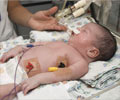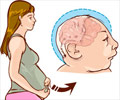study conducted in the United States reveals a slightly increased risk of birth defects in babies born through IVF.
The risk of cardiovascular, muscular and skeletal defects is slightly higher in babies born through assisted reproductive techniques such as in vitro fertilization (IVF) when compared to those conceived through natural means (6.2% Vs 4.4%).
The above finding would be valuable in the United States where nearly 1 percent of all children born are conceived through IVF. The study however fails to prove that IVF is the sole cause of the observed birth defect.The study was limited to children aged 1 year that hinders the extrapolation of the observation to babies born through IVF. Several factors involving the infertile couples and the treatment modality are believed to play a role in the increased risk for birth defects.
Although previous studies conducted across different regions of the world, suggested a greater possibility of birth defects in IVF babies, the study is the first of it’s kind to have been conducted in the United States.
Babies born from 1989 to 2002 were taken up for the study. Out of 1,462 children conceived through IVF, major defects were manifested in 90 of the study participants. 17 of the 343 children born through intrauterine insemination (IUI), and 369 of 8,422 naturally conceived children were found to have some form of birth defect. Statistical analysis done revealed a 6.2%, 5% and 4.4% birth defect rate in children born through IVF, IUI and natural conception respectively.
The fact that the birth defect rate is comparatively higher in the IUI group prevents the researchers to arrive at a definitive conclusion regarding IVF and birth defects.
In the routine IVF protocol, two or more embryos are commonly transferred to a woman's uterus to increase the chances of success. This has been pointed to increase birth defects owing to the possibility of multiple pregnancy (twins, triplets) and premature delivery.
Advertisement











